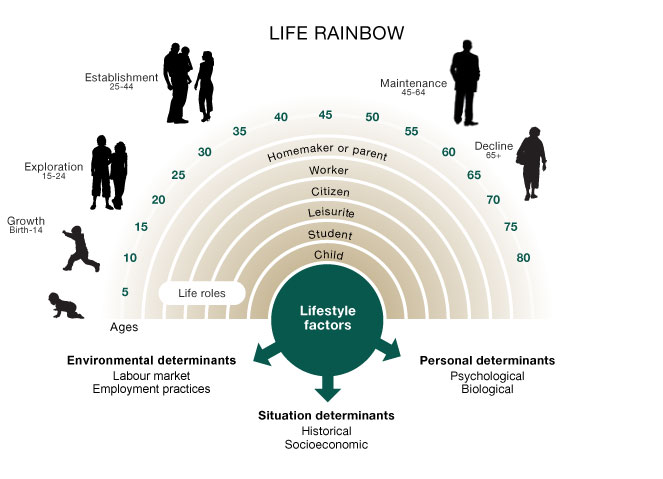Career theories are usually based on circumstances such as social, economical and environmental. The modern concept of career is a product of the industrial age. Traditionally, organizations would structure people’s career paths and lives. During these times, work was concentrated in employment, learning was concentrated in education and education gave way to employment. Career counseling was a concept introduced to the education systems to help individuals transit from one sector (education) to another. Continuous improvement in career was viewed as a lifelong process. Donald Super in 1953 shed light on this idea and proposed a theory. Holland in 1956 expanded on the psychology of personality in relation to career development and career choice. These two theories in particular and multiple others have included psychological and social aspects to the understanding of the career choices that people make. Career theories look at the complexity of career choice, adjustment and development. Donald Super’s Continue reading
Career Management
Career Development – Meaning, Definition and Stages
The concept of career development is of growing concern to organizations since it matches the needs of a business with the career goals of employees. Formulating a career development plan can help employees to do their jobs more efficiently. Additionally, these plans can be beneficial for employees who might want to move up in a company or look for other jobs in the future. Today, challenging organizations have developed new concerns for the career development of their employees. They put greater emphasis on ‘career’ with coherent induction, training and development, increased job security by the accrual of experience and qualifications valued in the labor market. Since a high majority of workers change their careers at midlife, it becomes evident that career development programs are needed throughout the life cycle. Other major reasons for this concern are: The growth and productivity of organizations depend on the effectiveness of employee performance. A Continue reading
Career Management – Definition and Meaning
Career is a general course of action, an individual chooses to pursue, all through his or her employment life. It may be represented as occupational positions a person has hold over so many years. Many people feel satisfied by achieving their career goals. At the same time, others have a strong feeling that, their careers, their lives and their potential has undergone unfulfilled. Employers too have a profound effect on employees’ careers. Some organisations have very formal career management processes, while others are very little concern about it. Career management is defined as the ongoing process of preparing, implementing and monitoring career plans. It can be undertaken either by the individual alone or can be a concerted activity along with the organisation’s career systems. Career management is a process that enables the employees to better understand their career skills, develop and give direction to it and to use those skills Continue reading
Career Development from the Perspective of an Individual Employee
Career development comprises those personal improvements one undertakes to achieve a career plan. The personnel department may sponsor these actions or they may be activities that employees undertake independent of the department. That is career development may be organizational and individual. From an organizational career standpoint, career development involves tracking career paths. In contrast, individual career development focuses on assisting individuals to identify their major career goals and to determine what they need to do to attain these goals. Each person must accept responsibility for his own career; assess his own interests, skills and values and take the step required to ensure a happy and fulfilling career. It is unwise to leave these jobs to others. In the case of individual career development, the focus is entirely on the individual and includes his career outside the organization as well as inside. So while organizational career development looks at individuals Continue reading
The Concept of Career Planning – Definition, Objectives and Process
Career is viewed as a bunch or collection of jobs or positions. Generally, it describes an applicable career path within the structure of the organization. Basically, it shows the principal personnel development paths within the organization. The etymology of the term derived from the Latin word career, which means race. All the jobs, that are held together during one’s working life, constitute career. It is also viewed as the sequence of positions held by an individual during the course of his employment life. Edwin B. Flippo defined a career, as a sequence of separate but related work activities that provide continuity, order and meaning in a person’s life. A career may be viewed as amalgamation of the changes in values, attitudes and motivation an individual embrace, as he or she grows older. This constitute subjective element of the concept “career”. Greenhaus and Schein described several themes underlying different definition of Continue reading
Career Planning Assistance by Human Resources Department
What is Career Planning ? Career planning is the process of one’s life work and involves evaluating abilities and interests, considering alternative career opportunities, establishing career goals, and planning practical development. Career planning is a deliberate process through which a person becomes aware of personal career related attributes and the lifelong sense of stages that contribute to his or her career fulfillment. The major focus of career planning is on assisting the employees achieve a better match between personal goals and the opportunities that are realistically available in the organization. Career programmers should not concentrate only on career growth opportunities. Practically speaking, there may not be enough high level positions to make upward mobility a reality for a large number of employees. Hence, career planning efforts need to pin-point and highlight those areas that offer psychological success instead of vertical growth. Career planning is not an event or end in Continue reading





